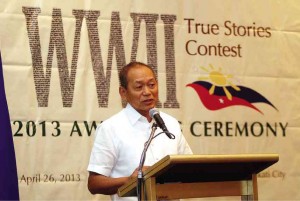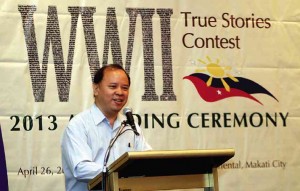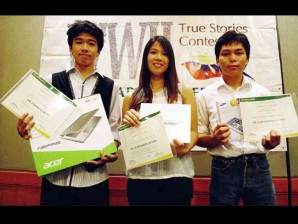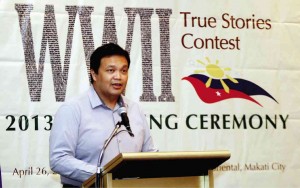War stories worth telling and retelling
Filomeno “Dodong” Avanceña Bautista Jr. had hoped somebody would tell the World War II stories about what happened in Mindanao. He noted that very little had been said about the situation in the south.
“We have good stories but they have not been documented,” the 86-year-old war survivor said. The tales were as rich as others and were worth keeping for posterity.
Now at least his personal war experiences as a boy in Cagayan de Oro City have been told by his own granddaughter, Celine Marie B. Itchon.
Bautista’s war memories won first prize in the WWII True Stories essay writing contest, a joint project of the Philippine Veterans Bank (PVB), Inquirer in Education and the Department of Education.
Itchon of St. Mary’s High School in Cagayan de Oro City received the judges’ nod for her retelling of how her grandfather’s family made a living during the war years.
Article continues after this advertisementShe was coached by her father and teacher Eduardo Itchon, who also mentored the third prize winner in the same competition in 2011.
Article continues after this advertisementAlthough Bautista’s children, including Itchon’s mother, had heard the story before, the granddaughter had only caught snippets of it. It was not until Itchon sat down with the old man for a formal interview did she hear his story in full. “What he went through made me more proud of him,” she said.
Another side to war
It also made her realize there was another side to the war. “It was not just about violence and hatred. There were also positive things.”
It was precisely what her grandfather wanted people to know about the war. “The war had good points. It unified Filipinos. They instinctively helped one another. Many people in the rural areas had big hearts. They did not hesitate to help when help was needed,” her grandfather said.
“There was a unity of purpose among the evacuees. The people’s spirituality was very strong. And, in spite of the war, there was so much hope,” he added.
Bautista came with his granddaughter when she received her Apple iPad (64GB) prize.
The other two top winners in the contest, their interviewees and teachers were also present at the awarding ceremony held at the Mandarin Hotel ballroom.
Second prize winner Dominic B. Dayta of Caloocan City Science High School received an Acer Aspire laptop. Her teacher-coach, Melvin M. Navarro, had also mentored a previous winner.
Julio Rodrigo M. Lopez, who is a home-schooled student, received a Samsung Galaxy Tab (16GB). His teacher-mentor happened to be his mom, Desiree.
University of the Philippines history professor Ricardo Jose, the foremost Filipino WWII expert and chair of the board of judges, said there were so many war heroes but the country did not have as many memorials for them.
The WWII True Stories Contest enabled young people to “see their heroism and see that they are worth emulating,” he said. Older people were extremely active as Filipinos during the war.
With the competition, organizations were “trying to keep history alive and their (WWII survivors) legacy is kept alive.”
Stories of heroism
Ricardo Balbido Jr., PVB president, said the competition was “making sure the young generation does not forget the heroism of WWII veterans.” They built the foundation for the freedom Filipinos enjoy today.
“The contest allowed the young to hear stories of heroism, bravery, patriotism and love of country,” he said.
Balbido added that people were now seeing that movies, particularly those made by foreigners, were not telling the true stories about the war. Los Baños (Laguna) was liberated by guerrillas before the Americans returned and by the time the Americans came, Yamashita was ready to surrender.
The day-to-day pressure on the enemy that made it easier for the Allies to defeat them came from Filipino soldiers and guerrillas, Balbido said.
The PVB president also commended the teachers, calling them unsung heroes. He said they made a lot of sacrifices but got very little appreciation. His voice almost breaking, Balbido admitted he got emotional when talking about teachers because his own mother was one.
Chelo Banal-Formoso, Learning section editor, said the contest was an opportunity for teachers and students to learn together about an important part of Philippine history.
She said the contest wanted to make history more personal for students and teachers through the stories about the sacrifices Filipinos made during the war so succeeding generations could live in peace and freedom.
The contest was also meant to hone interview, research and writing skills and reacquaint students with nationalism, which was lacking today, she said.
The three consolation prize winners of iPod Shuffles were announced by PVB vice president Miguel Angelo Villa-Real: Janz M. Sampaton of SPED Kalibo Integrated Special Education Center, Lille Faye N. Sarayan of Davao City National High School and Danielle Elisha F. Ching of University of the Philippines Rural High School.
All the winners and their coaches each received P5,000 in deposit accounts from PVB.
The winning stories are currently being published in a series in this section (See Page E4).
PHOTOS BY ARNOLD ALMACEN



